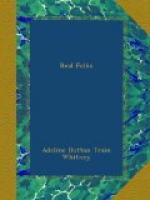“The coming out of the tomb was a small part of it; just what could not help being, if the rest was. Jesus Christ rose out of dead things, I take it, into these very real ones that we are talking of, and so lived in them. The resurrection is a man’s soul coming alive to the soul of creation—God’s soul. That is eternal life, and what Jesus of Nazareth was born to show. Our coming to that is our being ‘raised with Him;’ and it begins, or ought to, a long way this side the tomb. If people would only read the New Testament, expecting to get as much common sense and earnest there as they do among the new lights and little ‘progressive-thinkers’ that are trying to find it all out over again, they might spare these gentlemen and themselves a great deal of their trouble.”
The exclamation rose half-way to her lips again,—“I never knew you thought like this. I never heard you talk of these things before!”
But she held it back, because she would not stop him by reminding him that he was talking. It was just the truth that was saying itself. She must let it say on, while it would.
“Un—”
She stopped there, at the first syllable. She would not even call him “Uncle Titus” again, for fear of recalling him to himself, and hushing him up.
“There is something—isn’t there—about those who attain to that resurrection; those who are worthy? I suppose there must be some who are just born to this world, then, and never—’born again?’”
“It looks like it, sometimes; who can tell?”
“Uncle Oldways,”—it came out this time in her earnestness, and her strong personal appeal,—“do you think there are some people—whole families of people—who have no business in the reality of things to be at all? Who are all a mistake in the world, and have nothing to do with its meaning? I have got to feeling sometimes lately, as if—I—had never had any business to be.”
She spoke slowly—awe-fully. It was a strange speech for a girl in her nineteenth year. But she was a girl in this nineteenth century, also; and she had caught some of the thoughts and questions of it, and mixed them up with her own doubts and unsatisfactions which they could not answer.
“The world is full of mistakes; mistakes centuries long; but it is full of salvation and setting to rights, also. ’The kingdom of heaven is like leaven, which a woman hid in three measures of meal till the whole was leavened.’ You have been allowed to be, Desire Ledwith. And so was the man that was born blind. And I think there is a colon put into the sentence about him, where a comma was meant to be.”
Desire did not ask him, then, what he meant; but she turned to the story after he had gone, and found this:—
“Neither hath this man sinned, nor his parents, but that the works of God should be manifest in him.”
You can see, if you look also, where she took the colon out, and put the comma in.




